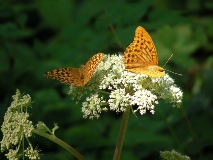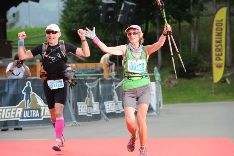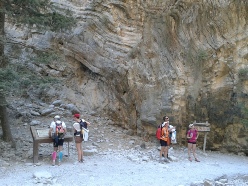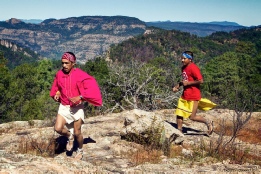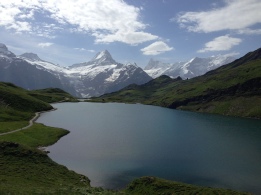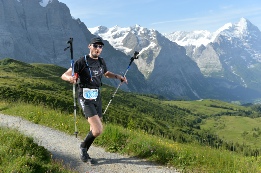











Eloge de la Douceur dans la Course et dans la Vie

Eloge de la Douceur
dans la Course et dans la Vie


Soyez gentils avec vous et avec les autres
La vie est assez dure comme ça pour en rajouter une couche. Je vous propose donc une philosophie de construction de soi, basée sur une approche DOUCE de la course à pied, afin d’être plus fort, plus joyeux et en meilleure santé. Ensuite, vous pourrez transposer cet “hédonisme ascétique” dans d’autres domaines de votre vie afin de contribuer humblement à rendre ce monde meilleur.

Vous pouvez aider vos amis en particulier et le monde en général en diffusant ce site et ses liens.

Under construction
Here is a guide from a Master, Scott Jurek, about the spirit of Trail Running: Good posture, relaxed and tall, controlled falling, ease into it!
The Gentle Guide to Ultra Running
Running is a child’s game, if you run like a child runs.
Now that you are running regularly, you may have noticed that running is not hard but pleasurable, as long as you ease into it.
Running is a child’s game, if you run like a child runs, i.e. run when you find it fun, walk when you feel tired, stop when you want to blow a dandelion flower or take a picture of a butterfly, eating wild berries, etc
If you run like a child runs, then, you like running in forests, in mountains, alongside rivers, etc.
And you do not see why you should stop before dusk, and even later.
Well, that is Trail Running.
Trail Running is typically distances from 30-50 km, up to 170 km or more, and in mountains, so you may have to climb a total 1’500 m to 10’000 m or more.
But distance and ascent parameters are not the point here.
Point #1 is finding an excuse to go running in beautiful landscapes, eating, drinking, sharing, filling your eyes and body and brains with long-lasting memories.
Point #2 is also to have a long-lasting effort that will force you into easiness and gentleness, as well as management of energy, food and drink, otherwise, you will never be able to finish.
Point #3 is to train gently, progressively, and consistently all year long, so that you build yourself a super strong body and mind. For me, that is the most important point. My goal is to get progressively stronger (muscles, joints, immune system, mind) without hurting myself. It thus need humility and gently progression, avoiding each time exhaustion. You have to find yourself the volume of exercise that suits you in that respect. If you go far, you will accumulate fatigue, and lose the whole benefit. You cannot recover from one session to another, your immune system will start to fail, you will catch microbes, etc. So the point is to get stronger and healthier when you train for Trail Running that if you do not.
You have to find the best balance for you, depending on your intrinsic fitness, your professional activity, your personal life. For me, I know that I will never be able to train for a true Ultra (170 km), because it requires too much time outside all year long. Also, I am not sure I can sustain an effort of more than 40 hours (given my estimated average speed for that distance) without adverse effects.
So I opted for a medium Trail, such as the Eiger Trail E51, with only? 51 km and 3200 m ascent. But for me, that is just fine. I trained for it and finished it without any muscle soreness after (in 2013 and 2014). And I still have a good 10% of runners behind me when I finish after 11 of 12 hours of “running” in the mountains. And I feel stronger as I train progressively for the event.
So now, how do I train?
The “Core Activity” is all-year round with 2 hours per week (2 x 10 km) of running in minimalist shoes plus some core exercise to keep your legs springy. Then, on top of that Core, you progressively add mountain runs, one every week-end, until you reach 2/3 of the expected race effort. In my case for the Eiger E51, I train up to a Sierre-Zinal type of run, i.e. 32 km and 2100 m ascent.
The 1st of the season must be short, less than 10 km and less than 1’000 ascent, i.e. around 2 hours of exercise. Each time, apply the Easiness and Gentleness Spirit. You want to push yourself a bit further than you feel comfortable in terms of intensity and length in order to get stronger. But you want to avoid injury or burn-out. The days after, you must feel some soreness in the muscles, but not too much, and for not more than 2-3 days. That is how you get stronger without injury or over-training.
Allow yourself plenty of sleep and recovery time. Otherwise fatigue will accumulate and you will get weaker until your burn out from over-training. And that is not the point at all!!!
Follow your sensations. Your training buddies may be faster and stronger. Do not try to compete. Remember your goals: Getting stronger and finish the Race with a big smile.
If you cannot recover fully after 2-3 days, while keeping the 2 sessions in the week, stay with this load. Once, you can recover fully, increase the WE mountain run to 3 hours, i.e. 15 kms and around 1400-1500 m ascent. Again, follow the same principle during and after the run.
Then, go to 4 hours, and increase by a one-hour increment, until you reach at least two thirds of the race metrics. See example of the Eiger E51 above.
Poles, backpack, food, liquids, smartphone, GPS/HR watch.
….. To be continued

